新概念英语第一册lesson71-72教材
Lesson71-72(课件)新概念英语第一册
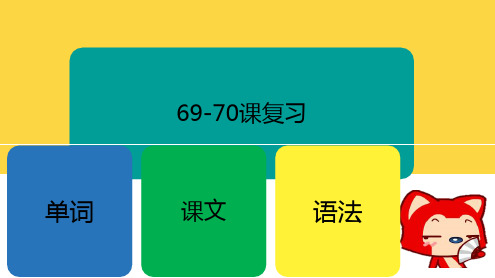
Lesson 71 He’s awful!
He telephoned me four times yesterday, three times the day before yesterday.
the day before yesterday 前天 时间状语
did not arrive I did not arrive home last night. I didn’t arrive home last night.
句型变化
变一般疑问句
I arrived home last night.
did
arrive
Did you arrive home last night?
Lesson 71 He’s awful!
Watch and answer the question: How did Pauline answer the telephone at nine? This is Pauline’s mother. Please don’t telephone my daughter again.
There be句型在一般过去时中的句型变换
变一般疑问句:Was/Were there…?
There were hundreds of people. Were there hundreds of people? Yes, there were. No, there weren’t.
新概念课堂检测
We are enjoying our lunch.
We
it yesterday, too.
总结
一般过去式 以实义动词引导的一般过去时 动词的过去式变化规则 表示过去时间的时间状语 句型变化
新概念英语第一册 71、72课件
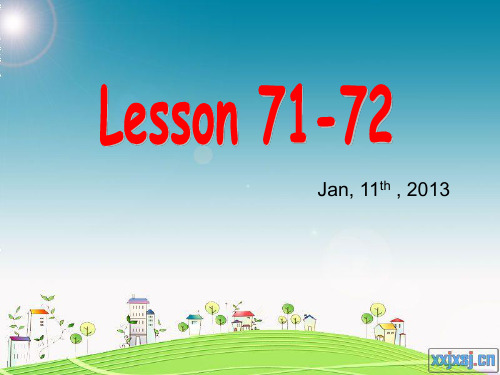
•逆时表达 3:50 ten to four 一刻钟/半点 5:15 a quarter past five 6:30 half past six 半小时之前用past 7:10 ten past seven 8:16 sixteen past eight 半小时以后用to 2:40 twenty to three 4:50 ten to five
Shedding tears 2012
A graduate becomes emotional at Fudan University in Shanghai, June 29, 2012.
Let’s review.
1.Time 时间表示法 •整点表示 1:00 one o’clock
•顺时表达 3:10 three ten
一般过去时动词变化规则
①直接加ed work—— worked look——looked play——played, ②以不发音e结尾的单词,直接加d live ——lived hope——hoped use——used, ③以辅音字母+y结尾的,变y为i加ed study—— studied carry——carried worry——worried, ④以元音字母+y结尾的,直接加ed enjoy ——enjoyed play——played
Shedding tears 2012
A baby cries while having his hair cut for Dragon Head-raising Day in Luoyang, Henan province, Feb 23, 2012, which marks the traditional Chinese festival Long Tai Tou (dragon head raising) and the start of spring and farming. During the festival, held on the second day of the second month of the lunar calendar, people play dragon lanterns, eat noodles, shave their heads, and pray for luck.
新概念英语第一册课件 NCE1 Lesson 71-72
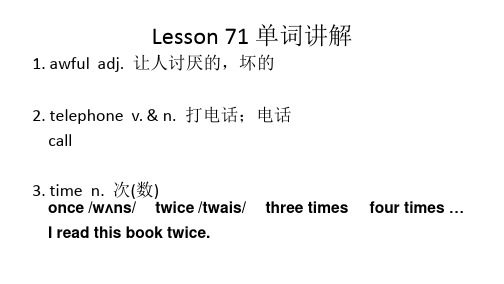
Lesson 71 单词讲解1.awful adj. 让人讨厌的,坏的2.telephone v. & n. 打电话;电话call3.time n. 次(数)once /wʌns/ twice /twais/ three times four times …I read this book twice.4.a nswer v. 接(电话)answer the phonest adj. 最后的,前一次的last night / last week / last month / last year6.phone n. 电话7.again adv. 又一次地Very nice to see you again.8.say (said) v. 说say /sei/ said /sed/ says /sez/say VS speaksay 强调说话的内容She said hello to me.He said sorry to me.My mom always says “Life was like a box of chocolate…”speak 突出说话的方式或动作本身speak loudly speak slowly speak EnglishLesson 71 课文讲解What is the climate like?What is the weather like?He telephoned me again.yesterday evening last nightLesson 71 语法讲解He was in the office.Was he in the office?Yes, he was. No, he wasn’t.He wasn’t in the office.Where was he?Who was in the office?There was a car race in our town in 1998. Was there a car race in our town in 1998? There wasn’t a car race in our town in 1998. What was there in our town in 1998?He went to school yesterday. do did /did/ Did wentDo he go he Do to school yesterday? ? e He like s coffee .He went to school yesterday. do notdid He donotgowent to school yesterday.He didn’t go to school yesterday.He went to school y e s t e r d a y. 他什么时候去上学了?did When do hegowent to school?He went to s c h o o l yesterday. 他昨天去哪了?did goWhere do he went yesterday?He w e n t to school yesterday. 他昨天干什么了?did doWhat do he did yesterday?He went to school yesterday. 昨天谁去上学了?Who went to school y esterday?She lived in New York.Did she live in New York? Yes, she did. No, she didn’t. She didn’t live in New York. Where did she live?Who lived in New York?I bought a book in that bookstore last week. bought /b ɔ : t/ buy 的过去式Did you buy a book in that bookstore last week? Yes, I did. No, I didn’t.I didn’t buy a book in that bookstore last week.When did you buy a book in that bookstore?Where did you buy a book last week?Lesson 72 单词句型讲解Today:this morningthis afternoonthis eveningLesson 72 单词句型讲解t onightLesson 72 单词句型讲解Yesterday:yesterday morningyesterday afternoonyesterday eveningLesson 72 单词句型讲解l ast nightThe day before yesterday:the day before yesterday in the morningthe day before yesterday in the afternoonthe day before yesterday in the evening如遇到视频无法正常播放,课件错误,知识点错t 误h 等e 课n 程问ig 题h ,t 可b 以e 添f 加o 服r 务e Ql Qa 3s 17t 0322794进行解决,学习问题请到知识堂: http:/Tomorrow:tomorrow morningtomorrow afternoontomorrow eveningtomorrow nightThe day after tomorrow:the day after tomorrow in the morningthe day after tomorrow in the afternoonthe day after tomorrow in the eveningthe night after next1.She is going to come now. (when)2.She can come now. (when)3.She wants a new bike. (what)4.There is a book on the table. (what)5.They like black coffee. (what)6.Mary comes from Germany. (where)7.He must go home now. (when)8.She feels ill. (how)9.He has a cold. (what)10.She cleaned her shoes. (when) A 一般疑问句B 特殊疑问句C 否定句1.She is going to come now. (when)Is she going to come now?When is she going to come?She isn’t going to come now.2.She can come now. (when)Can she come now?When can she come?She can’t come now.3.She wants a new bike. (what)Does she want a new bike?What does she want?She doesn’t want a new bike.• 4. There is a book on the table. (what)•Is there a book on the table?•What is there on the table?•There isn’t a book on the table.5.They like black coffee. (what) •Do they like black coffee?•What do they like?•They don’t like black coffee.6.Mary comes from Germany. (where) •Does Mary come from Germany?•Where does Mary come from?•Mary doesn’t come from Germany.7.He must go home now. (when) •Must he go home now?•When must he go home?•He needn’t / mustn’t go home now.8.She feels ill. (how) •Does she feel ill?•How does she feel?•She doesn’t feel ill.9.He has a cold. (what)•Does he have a cold?•What does he have?•What is the matter with him?•He doesn’t have a cold.10.She cleaned her shoes. (when) •Did she clean her shoes?•When did she clean her shoes?•She didn’t clean her shoes.。
新概念英语第一册第71-72课-He’s awful

新概念英语第一册第71-72课:He’s awfulLesson 71 He's awful!他讨厌透了! Listen to the tape then answer this question.How did Pauline answer the telephone at nine o'clock?听录音,然后回答问题。
波淋在9点接电话时是如何说的?Jane : What’s Ron Marston like , Pauline ?简:罗恩.马斯顿是怎样一个人?Pauline : He’s awful ! He telephoned me four times yesterday , and three times the day before yesterday.波淋:他讨厌透了!他昨天给我打了4次电话前天打了3次。
Pauline: He telephoned the office yesterday morning and yesterday afternoon. My boss answered the telephone .波淋:他昨天上午和下午把电话打到了我的办公室,是我的老板接的。
Jane : What did your boss say to him ?简:你老板是怎么对他说的?Pauline: He said ,”Pauline is typing letters .She can’t speak to you now !”波淋:他说:“波淋正在打信,她现在不能同你讲话!”Pauline : Then I arrived home at six o’clock yesterday evening .He telephoned again .But I didn’t answer the phone !波淋:后来,我昨晚6点钟回到家里。
他又打来电话,但我没接。
Jane : Did he telephone again last night ?简:他昨夜里又打电话了吗?Pauline : Yes , he did . He telephoned at nine o’clock .波淋:是的,打了。
新概念英语一册第71-72课件

telephone/ call sb the answer to the question 问题的答案 打电话
JANE: What did your boss say to him? PAULINE: He said, "Pauline is typing letters.
JANE: What's Ron Marston like, Pauline? PAULINE: He's awful!
He telephoned me four times yesterday, and three times the day before yesterday. PAULINE: He telephoned the office yesterday morning
PAULINE: Yes, he did. He telephoned at nine
o'clock.
JANE: _W__h_a_tdid _y_o_u__ say to him?
PAULINE: I said, 'This isP_a_u_l_in_e_'_s_ mother.
Please don't _t_e_le_p_h_o__nemy daughter again!'
• 7.在左边
on the left
• 8.在比赛中
in the race
• 9.一场激动人心 an exciting finish 的结尾
• 10.在回家的路 on the way home 上
课文拓展
• There is (be的适当形式 ) a car race near our town every year. • In 1995, there was (be的适当形式 ) a very big race. • There were hundreds of people (数以百计的… ) there. • My wife and I were (be的适当形式 ) at the race. • Our friends Julie and Jack were (be的适当形式 ) there, too. • You can see us (we的适当形式 ) in the crowd. • We are standing (stand的适当形式 ) on the left. • There were (be的适当形式 ) twenty cars in the race. • There were (be的适当形式 ) English cars, French cars, German cars,
新概念英语一册第71-72课件

tonight
last night
the night before last
一般过去时的练习
She is airing the room now. She aired it yesterday. rained 1. It is raining now. It yesterday. 2. It is snowing now. It snowed yesterday. 3. He is boiling some eggs. He boiled some yesterday. 4. We are enjoying our lunch. We enjoyedit yesterday, too.
如: He didn’t telephon me four times yesterday.
本课重点语法
本课重点语法
一般过去过的几种基本句型 3.) 一般疑问句及其回答:
Did +主语+动词原形+其它?句末用问号。 肯定回答:yes, …did. 否定回答:No, …didn’t.
本课重点语法
一般过去时(II)句型:例句 如: 陈述句:I walked to school yesterday. 否定句:I didn’t walk to school yesterday.
注 意 做 笔 记 哦!
一般过去时的练习
air--- aired clean-- cleaned open-- opened arrive-- arrived shave-- shaved live-- lived type-- typed climb-- climbed call--called
注 意 做 笔 记 哦!
本课重点语法
新概念英语NCE1_lesson71-72(共30页)课件

语音、词汇、听力课堂
听力训练
听细节
听力训练
语法课堂
上周语法回顾
回顾:
含有Be动词的句子变过去时,只用把Be动词
改为对应的过去式。
am/ is → wasre →
were
am not / isn't → waasrne'tn't →
weren't
用介词at, on和in的时间短语
【in】是“大姐”,因为后面所接的都是较长时间(月、年、 季节等)。
What does he do? What did he do?
总结: 一般过去时中,动词不能直接用于提问,需要助
动词did来帮忙。含有助动词的句子,动词要用原形。 do/ does 的过去式是 did,did的否定式是didn’t。
练一练
将下列句子变为一般疑问句,并对划线部分提问
He telephoned me four times yesterday. Did he telephone me four times yesterday? When did he telephone me four times?
He telephoned at nine o’clock. Did he telephone at nine o’clock? What did he do at nine o’clock?
I arrived home at six yesterday evening. Did you arrive home at six yesterday evening? What did you do at six yesterday evening?
2、以不发音的 -e 结尾动词,动词词尾加 -d,如: live---lived move----moved taste---tasted
新概念英语NCE1_lesson71-72(共13页)课件

• Yes, he did.
• He telephoned (telephone的适当形式) at nine o'clock.
• What did (do的适当形式) you say to him?
您身边的小升初英语专家----鑫鹏学校新概念部
课文再现-英汉互译
• He‘s awful!
• Then I arrived home at six o'clock
• 他讨厌透了!
• What's Ron Marston like, Pauline? • 朗·马斯顿是怎样一个人?
• He telephoned me four times yesterday,
• 前天打了3次。
• He telephoned the office yesterday morning and yesterday afternoon.
• 他昨天上午和下午把电话打到了我的办 公室,
• My boss answered the telephone • 是我的老板接的。
• He said,‘Pauline is typing letters. • 他说:“波琳正在打信,
• What did she do yesterday? • She aired the room yesterday.
• 1 they/ clean their shoes/ yesterday • 2 he/ open the box/ last night • 3 they/ sharpen their pencils/ this morning • 4 she /turn on the television/this evening
新概念一第71-72课课件(完整版)
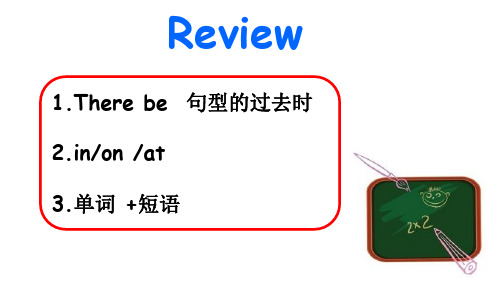
对以下句子的地点进行提问: • I am going to type the letter at home
tomorrow .
• I was at Lily's house last night .
小结:
1:划出句子中所要提问的部分。 2.when /where +然后把剩下的部分改成 一般疑问句
对以下句子的时间进行提问: • I am going to type the letter tomorrow .
• The teacher is busy(忙的) now .
• I was at Lily's house last night .
对“地点”的提问?
• in the classroom
PAULINE: He said, "Pauline is typing letters. She can't speak to you now!"
PAULINE: Then I arrived home at six o'clock yesterday evening.
He telephoned again. But I didn't answer the phone!
last [lɑ:st]
1) I was last in the car race . 2) I was at home last night .
time [taim]
1) What's the time ?
2)He telephoned me 4 times last night .
again [ə'ɡen]
e.g.I'm at home on weekends. When are you at home ?
新概念英语NCE1_lesson71-72(共18页)课件
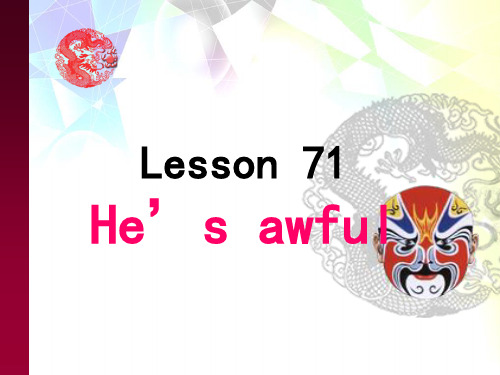
yesterday yesterday morning yesterday afternoon yesterday evening
last night
today this morning this afternoon this evening
tonight
What did you say to him?
• say 说的内容
• say “sorry” / ’hello’ to sb
• speak to sb/某种语言
• All of us speak Chinese.
• talk 谈话
• The teacher talked with my mother last night.
• tell 告诉
• Tell him the good news. • tell a story
•9、阅读使人充实,会谈使人敏捷,写作与笔记使人精确……史鉴使人明智;诗歌使人巧慧2021/9/252021/9/25Saturday, September 25, 2021 •10、每一本书是一级小阶梯,我每爬上一级,就更脱离畜生而上升到人类,更接近美好生活的观念,更热爱书籍。2021/9/252021/9/252021/9/259/25/2021 9:31:39 PM •11、书是人类进步的阶梯,终生的伴侣,最诚挚的朋友。2021/9/252021/9/252021/9/25Sep-2125-Sep-21 •12、阅读一本不适合自己阅读的书,比不阅读还要坏。我们必须会这样一种本领,选择最有价值、最适合自己所需要的读物。2021/9/252021/9/252021/9/25Saturday, September 25, 2021 13、He who seize the right moment, is the right man.谁把握机遇,谁就心想事成。2021/9/252021/9/252021/9/252021/9/259/25/2021 •14、谁要是自己还没有发展培养和教育好,他就不能发展培养和教育别人。2021年9月25日星期六2021/9/252021/9/252021/9/25 •15、一个爱书的人,他必定不致缺少一个忠实的朋友,一个良好的老师,一个可爱的伴侣,一个优婉的安慰者。2021年9月2021/9/252021/9/252021/9/259/25/2021 •16、提出一个问题往往比解决一个更重要。因为解决问题也许仅是一个数学上或实验上的技能而已,而提出新的问题,却需要有创造性的想像力,而且标志着科学的真正进步。 2021/9/252021/9/25September 25, 2021 •17、看文字须大段精彩看,耸起精神,竖起筋骨,不要困,如有刀剑在后一般。就一段中须要透;击其首则尾应,击其尾则首应,方始是。不可按册子便在,掩了册子便忘。 2021/9/252021/9/252021/9/252021/9/25
新概念英语一册第71-72课件
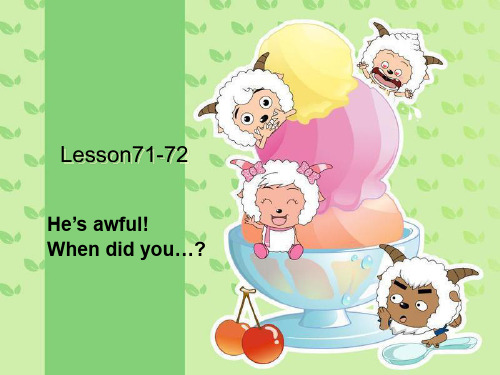
He telephoned at nine o'clock. JANE: What did you say to him? PAULINE: I said, 'This is Pauline's mother. Please don't telephone my daughter again!' JANE: Did he telephone again? PAULINE: No, he didn't!
本课重点语法
行为动词变一般过去时的构成
1.一般在动词后直接加-ed) answeq-answeqed wait---waited 2.以不发音的e结尾的动词直接加_d telephone--telephoned aqqive--aqqived 3.以辅音加y结尾的,把y改为i,再加ed empty--emptied
playing cards.
★answer v. 接(电话)
① v. 对……作出反应;响应 answer the phone/telephone answer the door/doorbell Mary took a few minutes to answer the door. ② v. 回答;答复 answer a letter I don’t think you’ve answered my question. ③ n. 答案;解决办法;答复 I wrote him several letters but couldn’t get an answer.
Do you know the answer to Question 10?
This is one of the possible answers to today’s environmental problems.
新概念第一册Lesson71-72教材

telephone /'telɪfəʊn/ v. & n. 打电话;电话
time /taɪm/
n. 次(数)
answer /'ɑːnsə/
v. 接(电话)
last /lɑːst/
adj. 最后的,前一次的
phone /fəʊn/ n. 电话(=telephone)
again /ə'gen/
adv. 又一次地
He telephoned again. But I didn't answer the phone!
JANE: Did he telephone again last night?
PAULINE: Yes, he did. He telephoned at nine o'clock. JANE: What did you say to him?
JANE: What did your boss say to him?
PAULINE: He said, "Pauline is typing letters. She can't speak to you now!"
PAULINE: Then I arrived home at six o'clock yesterday evening.
PAULINE: He's awful! He telephoned me four times yesterday, and three times the day before yesterday.
PAULINE: He telephoned the office yesterday morning and yesterday afternoon. My boss answered the telephone.
新概念第一册71和72课ppt课件
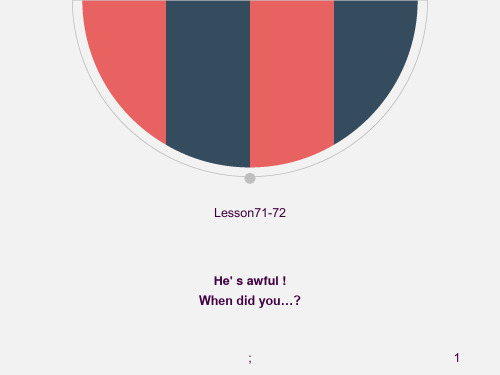
;
20
;
14
本课重点语法 一般过去过的几种基本句型
1.) 肯定句:主语+过去式+其它 如:He telephoned me four times yesterday.
2.) 否定句:主语+didn’t+动词原形+其它 如: He didn’t telephon me four times yesterday.
What's the climate like in your country?
What's the weather like in spring? 2、speak to sb. 与某人说话
May I speak to Pauline, please?
I’d like to speak to Pauline, please. 在电话中回答:This is…. 3、pretend as/to be 假装… 装作…
Lesson71-72
He' s awful ! When did you…?
;
1
New Words:
★awful adj. 让人讨厌的,坏的 awfully adv. 非常(在表示负面的情景中, 可用awfully代替very) 例句:I am awfully (very) sorry.
;
2
★time n. 次(数)- cn.
She pretended herself as her mother.
;
8
;
9
一般过去时(I)
Lesson 68, 70
概念:表示过去某一时间发生的动作或存在的状态,通常以动
语
词的过去式表示,其否定句和各种疑问句靠助动词did构成。
- 1、下载文档前请自行甄别文档内容的完整性,平台不提供额外的编辑、内容补充、找答案等附加服务。
- 2、"仅部分预览"的文档,不可在线预览部分如存在完整性等问题,可反馈申请退款(可完整预览的文档不适用该条件!)。
- 3、如文档侵犯您的权益,请联系客服反馈,我们会尽快为您处理(人工客服工作时间:9:00-18:30)。
I made a big mistake.
5. I’m sorry I’m late.
I’m sorry for being late.
* be sorry for sth/doing sth 对某事感觉很抱歉
我对我犯的错误感觉很抱歉。
日常用语——受到批评
(一)常用句型——表示批评 1. You have gone too far.
你太过分了。 It’s going a bit too far. It’s really annoying. * annoying 令人烦恼的,令人恼火的
2. I keep telling her not to do it, but it just goes in through one ear and out the other.
③ n. 答案;解决办法;答复 • 我给他写了好几封信,可都没有回音。
I wrote him several letters but couldn't get an answer. • 你知道第十题的答案吗?
Do you know the answer to Question 10?
• This is one of the possible answers to today's environmental problems. 这是有可能解决当今环境问题的办法之 一。
She pretended herself as her mother.
ቤተ መጻሕፍቲ ባይዱ习
• Why Pauline thinks that Ron is awlful? • How many times did Ron telephone
Pauline? • When did Ron telephone her at night? • How did her solve this problem? • Did Ron call her any more?
I’m sorry for my mistake. Please forgive me this time.
Don’t blame me!
I promise it will not happen again.
6. There is no reason for complaints.
* complaint 抱怨,不满
B: Sorry. It’s my fault. A: It just goes in through one ear and out
the other. And there are many errors in it. B: I feel completely guilty. A: Do it all over again. B: OK. I promise it will never happen again.
* guilty 内疚的,有罪的
A: What’s up? B: The manager just chewed me out. A: Oh, why? B: I didn’t finish the plan on time. A: Oh, it’s really your fault. B: Awful! A: It happens to everyone.
7. He is ready to take the blame for the accident.
* be ready to do sth 准备好做某事
安慰及鼓励
1. Cheer up! Don’t give up! Hang in there! Look on the bright side.
• What's the weather like in spring?
• speak to sb. 与某人说话 我能和Jack说话吗? May I speak to Pauline, please? =I’d like to speak to Pauline, please.
• 在电话中回答:This is…. • pretend as 假装
2. Don’t be too hard on yourself. =Don’t be too strict with yourself. 别对自己要求太严了。
3. We’ll never say die. = We’ll never give up. = We’ll keep going.
我们永不放弃。
My advice was flung away on him. 我的建议都被他当成了耳旁风。
* fling 扔、抛 3. Do you have a reason for being late?
=Why are you late?
There is a traffic jam. My watch doesn’t work, so I was late.
Lesson 71 He is awful!
• awful • telephone • time • answer • last • phone • again • say (said)
单词学习
adj. 让人讨厌的,坏的 v. & n. 打电话;电话 n. 次(数) v. 接(电话) adj. 最后的,前一次的 n. 电话(=telephone) adv. 又一次地 v. 说
★answer v. 接(电话) ① v. 对……作出反应;响应
• answer the phone/telephone 接电话 • answer the door/doorbell 应声开门 • 玛丽拖了几分钟时间才去开门。
Mary took a few minutes to answer the door. ② v. 回答;答复 • answer a letter 回信 • 我认为你没有回答我的问题。 I don’t think you’ve answered my question.
• 我一直在这里等着。 I've been waiting here all the time.
• 时间会证明一切。 Time will tell.
• 岁月不等人。 Time and tide wait for no man.
• 时间会治愈所有的创伤。 Time heals all wounds.
* chew sb out
训斥
A: I don’t feel like doing anything. I’m afraid I won’t be able to finish it on time.
B: Never say “never”! I bet we can make it.
A: You’re right. Maybe it’s not as difficult as it looks.
课文讲解
• What's Ron Marston like, Pauline? What is sb. like? 询问某人的外貌或品行。 你爸爸这个人怎么样? What's your father like?
• what’s … like? 什么怎么样? 你们国家的天气怎么样?
• What's the climate like in your country? 春天的天气是怎么样的?
B: No, it isn’t. I’m sorry. It won’t happen again.
A: You always say this. I’m fed up with your words.
* 反义疑问句中,陈述句是否定的,那么问句就 要用肯定的语气。
be caught in
受困于……
A: You have gone too far. I said many times. You must finish the plan on time.
* Never say “never”! 永不说不!
(二)典型对话
A: Do you have a reason for being late?
B: Sorry, I was caught in a traffic jam. So I was late.
A: This is not the first time, is it?
B: Yeah, we’ll never say die.
A: Come on!
★awful adj. 让人讨厌的,坏的 • awfully adv. 非常(在表示负面的情景中,
可用awfully代替very)
I am awfully(very) sorry. ★time n. 次(数) • time在英语中作不可数名词时表示“时
间”;作可数名词时表示“次数”,三次 或三次以上通常用基数词+times表示: once,twice,three times • on time 按时,准时 • in time 及时 • all the time 一直 • once upon a time 很久很久以前
* feel sorry for
let sb down
对……感到失望
表达沮丧之情
1. I’m depressed. 我很沮丧 We all lose heart. 我们都泄气了
2. I don’t feel like doing anything. I don’t want to work now. I want to ask for leave.
4. Please do it all over again.
=Do it over again.
=Redo it all!
全部重做
5. I feel sorry for you.
=I’m disappointed with you.
